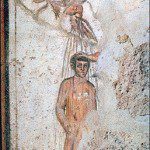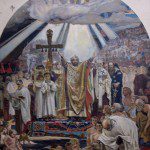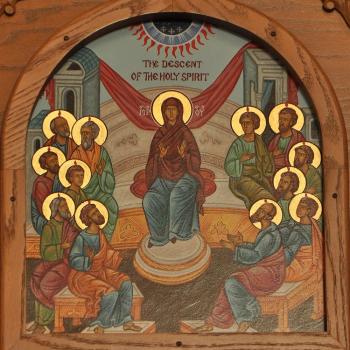St. Photina took to heart what Jesus said, indeed she suggested that this was what she expected the messiah would do. Not everyone would have agreed; some would have confronted Jesus with his vision, indeed, it is in part this vision, this restructuring of society and relativizing of the temple, which made him many enemies in Israel. Men of power, scribes who should have understood what he was going to do, all rejected Christ because he dismantled the powers that be, but this Samaritan woman revealed what others were afraid to say, allowing Jesus therefore to proclaim he is the messiah who will do as she wisely stated:
The woman said to him, “I know that Messiah is coming (he who is called Christ); when he comes, he will show us all things.” Jesus said to her, “I who speak to you am he” (John 4:25-6 RSV).
![By Anonymous (Center of Manuscripts (Tbilisi, Georgia)) [Public domain], via Wikimedia Commons](https://wp-media.patheos.com/blogs/sites/637/2017/05/Jesus_and_the_Samaritan_woman_Jruchi_Gospels_II_MSS_Georgia_12th_cent.-230x300.jpg)
St. Photina showed how open she was to Christ by how quickly she believed; indeed, St. John Chrysostom saw in her a wisdom which most of his followers did not receive until much later:
The woman straightway believed, showing herself much wiser than Nicodemus, and not only wiser, but more manly. For he when he heard ten thousand such things neither invited any others to this hearing, nor himself spoke forth openly; but she exhibited the actions of an Apostle, preaching the Gospel to all, and calling them to Jesus, and drawing a whole city forth to Him. Nicodemus when he had heard said, “How can these things be?” And when Christ set before him a clear illustration, that of “the wind,” he did not even so receive the Word. But the woman not so; at first she doubted, but afterwards receiving the Word not by any regular demonstration, but in the form of an assertion, she straightway hastened to embrace it. For when Christ said, “It shall be in him a well of water springing up into everlasting Life,” immediately the woman says, “Give me this water, that I thirst not, neither come hither to draw.”[2]
And so Jesus taught her – leading her to transcendent truths:
Seest thou how much more elevated in mind she has become? She who was anxious that she might not be troubled for thirst, now questions concerning doctrines. What then does Christ? He does not resolve the question, (for to answer simply to men’s words was not His care, for it was needless, ) but leads the woman on to the greater height, and does not converse with her on these matters, until she has confessed that He was a Prophet, so that afterwards she might hear His Word with abundant belief; for having been persuaded of this, she could no longer doubt concerning what should be said to her.[3]
We, too, who come to Christ, come to him with all kinds of questions; with faith, we let him guide us so that, through our walk with him, we slowly see how such questions are worthless. They kept us trapped in a discursive way of thought modeled after the way the fallen intellect, blinded by ignorance. As long as we think along such lines, with such limited means, we will never be able to see past our nose and realize the truth for ourselves. We have to let go of our conventions, our ways of thought which get us entangled in paradoxes, so that we can witness the truth in ourselves, know it in a way beyond words and the limitations which such words put upon the truth. Then we, like St Photina, can be directed to a greater height, where we witness the truth in silence. The reorientation of the world heals the divisions established by sin, but to witness and encounter the body of transcendent truth, we must let go off our discursive reasoning which seeks to divide the world, so that in the end we can see the beautiful unity which Christ has brought and enjoy his gift to us, the living water of the Spirit of Truth.
Jesus led St Photina to a great spiritual truth which his disciples were not yet ready to understand or appreciate. After going to great heights with her, he had to once again return to his disciples, meeting them and their confusion:
Just then his disciples came. They marveled that he was talking with a woman, but none said, “What do you wish?” or, “Why are you talking with her?” (John 4:27 RSV).
Jesus shared with Photina a little of the kingdom of heaven; her faith opened her up, and let her see and experience a foretaste of the glory which was to come. She enlightened, a wise woman beyond her years. When the apostles returned to Jesus, they saw him talking to a woman and marveled, not because of her greatness, but because they could not yet see her for her greatness and so it looked like Jesus had lowered himself to talk to her. Instead, it was with them he had to lower himself, and he did so out of love, knowing that they, too, could once day understand what St. Photina had received from him. They did not yet understand, just as the world even today does not understand the way Christ reconfigures creation so as to overturn the barriers established by sin.
The Samaritan Woman came to the well in faith; / She saw You, the Water of Wisdom, and drank abundantly / She inherited the Kingdom on High and is ever glorified! (Kontakion Sunday of the Samaritan Woman)
Let us, therefore, follow her and drink from the well of Christ, receiving the true wisdom from on high. Like her, let Christ cut away our dualistic understanding of the world so we can see the kingdom of God which lies beyond that dualism, the kingdom of God which Christ has revealed to the world.
[1] See Jn. 4:15-25.
[2]St. John Chrysostom, “Homilies on St John “ in NPNF1(14): 112.
[3]Ibid., 113-4.
Stay in touch! Like A Little Bit of Nothing on Facebook:
A Little Bit of Nothing













